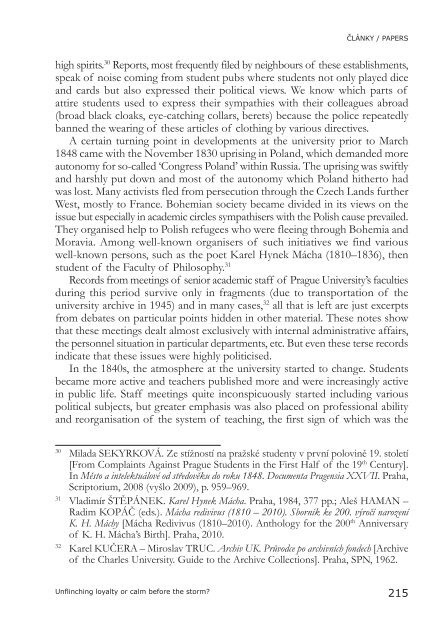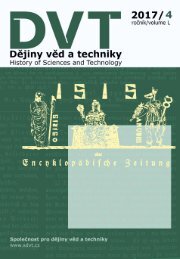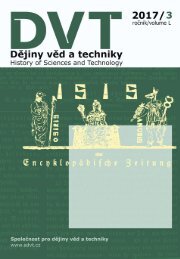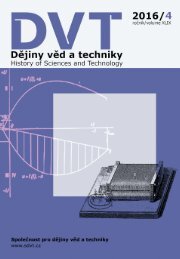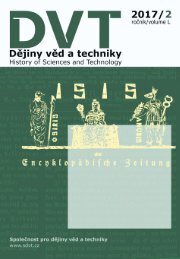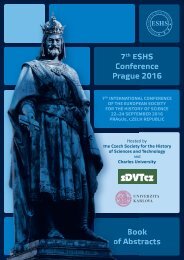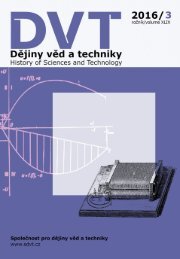Dějiny věd a techniky 2015, 4
Číslo je věnováno 7. mezinárodní konferenci Evropské společnosti pro dějiny vědy, která se konala 22.–24. září 2016 v Praze.
Číslo je věnováno 7. mezinárodní konferenci Evropské společnosti pro dějiny vědy, která se konala 22.–24. září 2016 v Praze.
Create successful ePaper yourself
Turn your PDF publications into a flip-book with our unique Google optimized e-Paper software.
ČLÁNKY / PAPERS<br />
high spirits. 30 Reports, most frequently filed by neighbours of these establishments,<br />
speak of noise coming from student pubs where students not only played dice<br />
and cards but also expressed their political views. We know which parts of<br />
attire students used to express their sympathies with their colleagues abroad<br />
(broad black cloaks, eye-catching collars, berets) because the police repeatedly<br />
banned the wearing of these articles of clothing by various directives.<br />
A certain turning point in developments at the university prior to March<br />
1848 came with the November 1830 uprising in Poland, which demanded more<br />
autonomy for so-called ‘Congress Poland’ within Russia. The uprising was swiftly<br />
and harshly put down and most of the autonomy which Poland hitherto had<br />
was lost. Many activists fled from persecution through the Czech Lands further<br />
West, mostly to France. Bohemian society became divided in its views on the<br />
issue but especially in academic circles sympathisers with the Polish cause prevailed.<br />
They organised help to Polish refugees who were fleeing through Bohemia and<br />
Moravia. Among well-known organisers of such initiatives we find various<br />
well-known persons, such as the poet Karel Hynek Mácha (1810–1836), then<br />
student of the Faculty of Philosophy. 31<br />
Records from meetings of senior academic staff of Prague University’s faculties<br />
during this period survive only in fragments (due to transportation of the<br />
university archive in 1945) and in many cases, 32 all that is left are just excerpts<br />
from debates on particular points hidden in other material. These notes show<br />
that these meetings dealt almost exclusively with internal administrative affairs,<br />
the personnel situation in particular departments, etc. But even these terse records<br />
indicate that these issues were highly politicised.<br />
In the 1840s, the atmosphere at the university started to change. Students<br />
became more active and teachers published more and were increasingly active<br />
in public life. Staff meetings quite inconspicuously started including various<br />
political subjects, but greater emphasis was also placed on professional ability<br />
and reorganisation of the system of teaching, the first sign of which was the<br />
30<br />
Milada SEKYRKOVÁ. Ze stížností na pražské studenty v první polovině 19. století<br />
[From Complaints Against Prague Students in the First Half of the 19 th Century].<br />
In Město a intelektuálové od středověku do roku 1848. Documenta Pragensia XXVII. Praha,<br />
Scriptorium, 2008 (vyšlo 2009), p. 959–969.<br />
31<br />
Vladimír ŠTĚPÁNEK. Karel Hynek Mácha. Praha, 1984, 377 pp.; Aleš HAMAN –<br />
Radim KOPÁČ (eds.). Mácha redivivus (1810 – 2010). Sborník ke 200. výročí narození<br />
K. H. Máchy [Mácha Redivivus (1810–2010). Anthology for the 200 th Anniversary<br />
of K. H. Mácha’s Birth]. Praha, 2010.<br />
32<br />
Karel KUČERA – Miroslav TRUC. Archiv UK. Průvodce po archivních fondech [Archive<br />
of the Charles University. Guide to the Archive Collections]. Praha, SPN, 1962.<br />
Unflinching loyalty or calm before the storm?<br />
215


